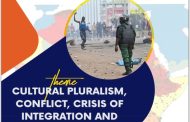It is still a UK controversy but there is no guarantee it would not expand into a global controversy. And the question is whether closing schools helps against spread of COVID-19 or not. The question arises because children are not vulnerable to COVID – 19.
 As far as a team of scientists at the University College London, (UCL) are concerned, closing schools add no value to grand or tactical approaches to containing spread of COVID-19 because, according to a BBC Online report, keeping pupils off schools has little impact, even with other lockdown measures.
As far as a team of scientists at the University College London, (UCL) are concerned, closing schools add no value to grand or tactical approaches to containing spread of COVID-19 because, according to a BBC Online report, keeping pupils off schools has little impact, even with other lockdown measures.
But this is not a consensus as the scientist from the Imperial College London and on whose work the UK based the strategy of closing schools is insisting that closing schools play an important role.
According to the BBC, the UK Government is already in the mood to review its coronavirus policies after Easter, showing how experts rule the world of policy in countries that have credible universities, research institutes and think tanks.
Children can be infected but “they rarely get severe symptoms” even as they can spread the virus. This is the train of thought behind the school closure strategy at the moment. But, in the scientific community, every line of thinking is open to constant interrogation to see if something unscientific has crept in.
What is showing in that regard now is over the report of a research published in The Lancet Child and Adolescent Health which looked at 16 studies – some based on the spread of coronavirus, and others on seasonal flu and the 2003 SARS outbreak. The BBC’s summary of the findings goes like this:
- While school closures help during influenza outbreaks, the same may not apply to coronavirus
- Data from the SARS outbreak (in mainland China, Hong Kong, and Singapore) suggest that school closures did not contribute to the control of the epidemic
- Recent modelling studies of Covid-19 predict that school closures alone would prevent only 2%-4% of deaths, many fewer than other social distancing interventions
 The question is how reliable the research findings are. The BBC reports Prof Russell Viner, one of the brains behind the research report as saying that data on the benefit of school closures in the coronavirus outbreak is limited but that what the data shows is that the impact is likely to be only small. The professor is highlighting how high the costs of national school closures are as well as damage to children’s education, family finances and how children’s mental health may suffer and, therefore, asserting the need for policymakers to weigh up the possible harms and reopen schools at the earliest opportunity without necessarily waiting until September “if it can be done safely sooner”
The question is how reliable the research findings are. The BBC reports Prof Russell Viner, one of the brains behind the research report as saying that data on the benefit of school closures in the coronavirus outbreak is limited but that what the data shows is that the impact is likely to be only small. The professor is highlighting how high the costs of national school closures are as well as damage to children’s education, family finances and how children’s mental health may suffer and, therefore, asserting the need for policymakers to weigh up the possible harms and reopen schools at the earliest opportunity without necessarily waiting until September “if it can be done safely sooner”
Prof Neil Ferguson, from Imperial College London and on whose advice the current policy of school closure is based is, however, saying the Lancet research fails to take into account the impact that school closure can have alongside other lockdown measures. His own verdict is rather that “When combined with intense social distancing, it plays an important role in severing remaining contacts between households and thus ensuring transmission declines”.
The BBC story is, instructively, asking if the policy would now change, recalling the explanation by Prof Chris Whitty, the Chief medical officer that schools were “not dangerous” for children during the pandemic but that the decision to close them would slow the rise of infections.
 This is now the third week schools are closed in the UK and in many other countries as well. It is to stem what British Prime Minister, Boris Johnson said was to avoid a “catastrophic epidemic” through a necessary move of “further downward pressure” on the virus. Now, scientists from two of the leading UK agenda setters in matters of knowledge – University College and Imperial College – are in disagreement over the move.
This is now the third week schools are closed in the UK and in many other countries as well. It is to stem what British Prime Minister, Boris Johnson said was to avoid a “catastrophic epidemic” through a necessary move of “further downward pressure” on the virus. Now, scientists from two of the leading UK agenda setters in matters of knowledge – University College and Imperial College – are in disagreement over the move.
In comes the BBC into the puzzle with the question of the practicality of letting schools reopen. The BBC returns to the UK’s pool of experts to try to answer the question as in the following interviews:
Dr Samantha Brooks, from King’s College London and team member of the NIHR Health Protection Research Unit in Emergency Preparedness & Response, said: “The finding that school closures have at best only a small impact on the spread of Covid-19 is of great significance, especially linked with the sensible suggestions for how a gradual return to normal schooling could be implemented.”
Prof Robert Dingwall, professor of Sociology at Nottingham Trent University, said: “This is an important study that confirms what many of us suspected, namely that the public health benefits of school closures were not proportionate to the social and economic costs imposed on children and their families.
“It also underlines how the assumptions used in modelling the pandemic may rest on very flimsy foundations in terms of scientific evidence. This work suggests that UK schools could, and should, begin to reopen as soon as practicable after the initial wave of cases has passed through.”
It is not clear how the debate might look like in the US, India, France, Italy and Iran or in Africa. In Africa, for instance, would it also be a contentious issue or a consensus among the experts and based on which contextual data in, say, Nigeria? Or is it the case that what the egg heads in the UK are trying to sort out just not applicable outside of it? Only time will tell!




























